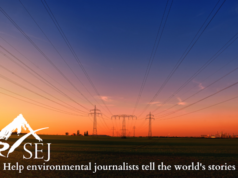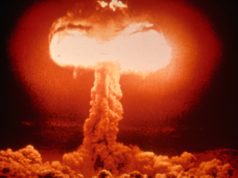
Anne Harper and her family, along with their 14 or so neighbors, have a serious problem. The place they care about most, their home, is about to be changed forever and not in a good way. They are trying desperately to save their small rural community, which the locals call Pleasant View, from yet another oil and gas industry assault — but no one seems to be listening to their pleas for help, no one seems to care about their plight, no one.
In the past, I might have used this spot in my column to describe the health and economic dangers of fracking, the lost property values, the skin rashes, bloody noses or elevated levels of carcinogens such as benzene that can enter the bloodstream from constantly breathing in the Volatile Organic Compounds off-gassed by the industry’s production platforms — platforms that are several acres in size (these are the same industrial production platforms that the industry lies about in its TV commercials by claiming that they are about the size of your garage, which is true if you happen to have a 1,200- car garage attached to your house).
Not so long ago, in order to make my point stick, I would have described Anne’s sleepless nights, her tears, her fears of what will be lost when the oil industry sets up shop just a stone’s throw from her dream home in the country.
But not this time.
I’m afraid that most folks, no matter how deeply they care about the human tragedies unfolding from the current oil and gas invasion into our living space, just can’t hear it anymore. It seems we’re becoming deaf to the word “fracking” and all the negative tales that accompany it. It’s as if the stories of people’s lives being destroyed by the world’s greediest, most polluting industry have simply lost their ability to make us feel anything.
There is an explanation for why this is happening. In psychological terms, we are experiencing what is being called “a collapse of compassion.”
Stalin actually got it right when he said, “A single death is a tragedy; a million deaths is a statistic.” He understood something that most of us still don’t. Even modern day psychologists are only now starting to research and grasp the importance of Stalin’s pragmatic observation.
In oversimplified terms, when we see or hear about one family whose dreams have been destroyed by the oil and gas industry, we are moved to reach out, give money, even take action. We have empathy, we mourn their loss of home and health. When we hear the same story over and over again, dozens, even hundreds or thousands of times, we feel little. The new research says that this collapse of compassion is actually a mental self-defense mechanism. Our brains create no empathy or compassion out of fear such mass tragedy might cause us to lose control, to hurt too much. We protect ourselves by becoming deaf, literally numb to the pain of others.
I’m afraid I am a case in point.
Anne Harper first started leaving messages on my phone at the paper more than two months ago. In those recordings, left over several weeks, she described her small community of homes with passion, clarity and an understandable sense of panic. Over the course of several missed calls, she described the historical significance of the old Pleasant View cemetery and schoolhouse. She described the breathtaking views of the Back Range from her front window.
She also bemoaned how that view would soon be decimated by the dozens of tall towers and tanks planned for the two five-acre production platforms about to be built just west of her home (think 2,400-car garage that stands about 40 feet tall). She also expressed worry about the coming months and years of drilling activity with its sleepdepriving lights and noise along with foundation-shaking vibrations and screaming gas flares that will accompany the 12 new wells that the state has already approved for Encana even though several questions about locations and access have yet to be resolved. She doesn’t understand how her community will be able to use its tiny onelane road if it has to share it with a hundred thousand truck trips.
In December, Anne left me phone messages and emails about all the Weld County bureaucrats she was talking to as well as the Colorado Oil and Gas Conservation Commission, the governor-appointed board that is charged with both promoting and regulating the oil industry — a task it does half right. In the later messages she wondered aloud why she was being ignored, why the policy makers had stopped taking her calls, why no one offered any help or hope or even empathy for her situation and effort to save her home and community.
She also wondered why I hadn’t returned her calls for more than a month. I wondered that myself.
I knew exactly where Anne lived. Her home sits ever so slightly across the invisible line that separates Boulder and Weld counties. Her house is just about the same distance on the wrong side of that line as my home is on the right side. Right and wrong being defined only by which side of County Line Road has a Boulder County moratorium on drilling permits and a Longmont fracking ban and which side doesn’t. Her side doesn’t.
I have driven past the Pleasant View schoolhouse and cemetery a thousand times, almost daily except when the flood took out the bridge between my house and Anne’s. I’ve parked and walked among the weathered gravestones looking west at the snowcapped mountains. Yes, I have shared Anne’s view many times. It is one of my favorite vistas anywhere. But I could not bring myself to call her back.
What could I say, “I’m sorry”? “I’m sorry you had the bad luck to live 1,000 feet into Weld County so the state of Colorado is going to allow, even encourage, Encana to destroy everything you have worked for your entire life”?
Would it have made her feel better to know that her incomprehensibly unfair situation was in no way unique — that the state and oil industry are so in bed with one another that they have done the exact same thing to thousands of other innocent taxpaying homeowners cursed to live in places with shale oil and spineless local officials?
Would it have helped for me to tell her that her community’s tragic story isn’t even news anymore because sticking oil and gas wells next to people’s houses potentially making them sick and threatening their property values has become so commonplace?
Would it have encouraged her to hear that there is nothing that anyone can do to stop what is happening to her, except maybe to pray that the price of oil quickly collapses to $35 a barrel, causing Encana to lay over its rigs and crawl back to Canada to wait for the next boom?
Even if I told her that I truly believe Coloradans are going to make absolutely sure no one trades away our right to vote for an oil and gas community control amendment to the state constitution the next time around in 2016, it wouldn’t make any difference. By 2016, it will be too late for Anne, her family, her neighbors and their way of life. Also, as a rural Weld County resident, there is no incorporated legal municipality or willing county government to protect her rights. The rigs are on the way and I fear it will take a miracle in the oil market to stop them cold.
I now realize I didn’t call Anne back because I didn’t think I had anything left to say. Her story was not that different from the others I hadn’t written about of late. In hindsight, I had run out of words for people like Anne who leave me desperate messages every month about how the oil and gas industry is ruining their lives, their health or their life savings by way of diminished home values. I had stopped feeling their pain. My compassion had collapsed.
From Pennsylvania to California, from North Dakota to Texas to Colorado, the sheer numbers of lives unfairly harmed by the oil and gas industry coupled with clueless politicians and poor regulation had made me somewhat deaf to the pain of those looking to BW for help.
I eventually called Anne and went to see her. I have no doubt she did far more for me than I did for her. She turned my world of negative oil and gas statistics back into one family’s tragedy. Her willingness to fight on against all odds inspired me. Her decision to get baseline measurements of her family’s blood, the area’s groundwater and air, to have her home appraised before the wells move in said it all. She may not be able to stop Encana from invading her neighborhood, but she may be able to make them pay for the damages they may cause to her family’s health, the environment and her home’s value. Maybe her actions will inspire other families and entire communities to do the same thing, get the baseline information before the wells are drilled. Such action could help stop the current industry excuse that gets tossed out every time contamination is found in air or water or cancer-causing benzene appears in the blood of someone living near a well or production platform; namely, “You can’t prove it wasn’t already that way before we came along.”
Perhaps Anne’s battle to save her Pleasant View community will change all that. Maybe her battle will help create a more fair regulatory system, one that puts surface owners on equal footing with mineral owners and oil companies.
Who knows? For now I’m just relieved that I can answer the phone calls for help again, and have empathy and compassion for the callers.
Respond: [email protected]














